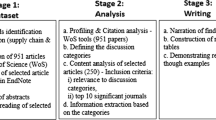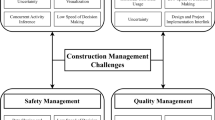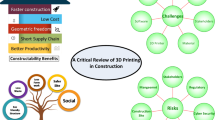Abstract
The increasing frequency of extreme weather (EW) events has created significant vulnerabilities in the normal operations of the prefabricated construction supply chain (PCSC). This study aims to enhance the resilience of the PCSC against EW by utilizing smart contracts. The study proposes a prototype smart contract application to mitigate the risks posed by EW to the PCSC. Additionally, it identifies 28 potential barriers affecting smart contract adoption in the PCSC using the Technology-Organization-Environment framework. Furthermore, the paper presents a multi-objective optimization-based group decision-making method to assess the feasibility of smart contract adoption in the PCSC. An online survey was then conducted among 50 stakeholders from various links of the PCSC to gather insights into smart contract adoption. The results indicate that stakeholder awareness of smart contracts and the current corporate level are the most influential factors in decision-making. This research extends the application of smart contracts to risk management within the PCSC, offering valuable insights for stakeholders to enhance resilience and address the adverse effects of EW proactively.







Similar content being viewed by others
References
Adams JS (1963) Towards an understanding of inequity. J Abnormal Soc Psychol 67(5):422
Adams JS (1965) Inequity in social exchange. In: Advances in experimental social psychology, vol 2. Elsevier, pp 267–299
Agi MA, Jha AK (2022) Blockchain technology in the supply chain: an integrated theoretical perspective of organizational adoption. Int J Prod Econ 247:108458
Alazab M, Alhyari S, Awajan A, Abdallah AB (2021) Blockchain technology in supply chain management: an empirical study of the factors affecting user adoption/acceptance. Clust Comput 24(1):83–101
Babich V, Hilary G (2020) OM Forum—Distributed ledgers and operations: What operations management researchers should know about blockchain technology. Manuf Serv Oper Manag 22(2):223–240
Bakhtiarizadeh E, Shahzad WM, Poshdar M, Rotimi JOB (2022) Blockchain technology applicability in New Zealand’s prefabricated construction industry. Eng Manag Prod Serv 14(1):103–112
Batubara FR, Ubacht J, Janssen M (2018) Challenges of blockchain technology adoption for e-government: a systematic literature review. In: Paper presented at the proceedings of the 19th annual international conference on digital government research: governance in the data age
Bezdek JC, Spillman B, Spillman R (1978) A fuzzy relation space for group decision theory. Fuzzy Sets Syst 1(4):255–268
Büyüközkan G, Tüfekçi G, Uztürk D (2021) Evaluating blockchain requirements for effective digital supply chain management. Int J Prod Econ 242:108309
Cai M, Lin Y, Han B, Liu C, Zhang W (2016) On a simple and efficient approach to probability distribution function aggregation. IEEE Trans Syst Man Cybern Syst 47(9):2444–2453
Chang JP, Chen ZS, Wang ZJ, Jin L, Pedrycz W, Martínez L, Skibniewski MJ (2022) Assessing spatial synergy between integrated urban rail transit system and urban form: a BULI-based MCLSGA model with the wisdom of crowds. IEEE Trans Fuzzy Syst 31(2):434–448
Chen S, Liu X, Yan J, Hu G, Shi Y (2021a) Processes, benefits, and challenges for adoption of blockchain technologies in food supply chains: a thematic analysis. IseB 19(3):909–935
Chen Z-S, Liu X-L, Chin K-S, Pedrycz W, Tsui K-L, Skibniewski M (2021b) Online-review analysis based large-scale group decision-making for determining passenger demands and evaluating passenger satisfaction: case study of high-speed rail system in China. Inf Fusion 69:22–39
Chen Z-S, Zhu Z, Wang ZJ, Tsang Y (2023a) Fairness-aware large-scale collective opinion generation paradigm: a case study of evaluating blockchain adoption barriers in medical supply chain. Inf Sci 635:257–278
Chen Z-S, Zhu Z, Wang XJ, Chiclana F, Herrera-Viedma E, Skibniewski MJ (2023b) Multiobjective optimization-based collective opinion generation with fairness concern. IEEE Trans Syst Man Cybern Syst 53(9):5729–5741
Chen Z-S, Zhou J, Zhu CY, Wang ZJ, Xiong SH, Rodríguez RM, Martínez L, Skibniewski MJ (2023c) Prioritizing real estate enterprises based on credit risk assessment: an integrated multi-criteria group decision support framework. Financ Innov 9(1):120
Chen Z-S, Lu J-Y, Wang X-J, Pedrycz W (2024) Identifying digital transformation barriers in small and medium-sized construction enterprises: a multi-criteria perspective. J Knowl Econ. https://doi.org/10.1007/s13132-023-01680-4
Chittipaka V, Kumar S, Sivarajah U, Bowden JL-H, Baral MM (2022) Blockchain technology for supply chains operating in emerging markets: an empirical examination of technology-organization-environment (TOE) framework. Ann Oper Res 1–28
Chang JP, Chen ZS, Wang XJ, Martínez L, Pedrycz W, Skibniewski MJ (2023) Requirement-driven sustainable supplier selection: Creating an integrated perspective with stakeholders’ interests and the wisdom of expert crowds. Comput Ind Eng 175:108903
Chen ZS, Wang Y, Xu YQ, Zhu Z, Chen YH, Skibniewski MJ (2024) Towards social-welfare and confidence optimizing approach to examining barriers for digital transformation in SMCEs. Inf Sci 120312.
Choi T-M, Luo S (2019) Data quality challenges for sustainable fashion supply chain operations in emerging markets: roles of blockchain, government sponsors and environment taxes. Transp Res Part e Logist Transp Rev 131:139–152
Choi T-M, Feng L, Li R (2020) Information disclosure structure in supply chains with rental service platforms in the blockchain technology era. Int J Prod Econ 221:107473
Christidis K, Devetsikiotis M (2016) Blockchains and smart contracts for the internet of things. IEEE Access 4:2292–2303
Crosby M, Pattanayak P, Verma S, Kalyanaraman V (2016) Blockchain technology: beyond bitcoin. Appl Innov 2(2):6–19
De Giovanni P (2020) Blockchain and smart contracts in supply chain management: a game theoretic model. Int J Prod Econ 228:107855
Deloitte (2017) Using blockchain to drive supply chain innovation. Retrieved from https://www2.deloitte.com/us/en/pages/operations/articles/blockchain-supply-chain-innovation.html
Deng N, Shi Y, Wang J, Gaur J (2022) Testing the adoption of blockchain technology in supply chain management among MSMEs in China. Ann Oper Res 1–20
Depietro R, Wiarda E, Fleischer M (1990) The context for change: organization, technology and environment. Process Technol Innov 199:151–175
DeSanctis G, Gallupe RB (1987) A foundation for the study of group decision support systems. Manag Sci 33(5):589–609
Ding Y, Du Y (2022) China intensifies efforts to promote prefabricated construction. Retrieved from http://en.qstheory.cn/2022-02/14/c_706881.htm
Dong Y, Li Y, He Y, Chen X (2021) Preference–approval structures in group decision making: axiomatic distance and aggregation. Decis Anal 18(4):273–295
Du J, Liu S, Liu Y (2022) A limited cost consensus approach with fairness concern and its application. Eur J Oper Res 298(1):261–275
Duan J, Zhang C, Gong Y, Brown S, Li Z (2020) A content-analysis based literature review in blockchain adoption within food supply chain. Int J Environ Res Public Health 17(5):1784
Dutta P, Choi T-M, Somani S, Butala R (2020) Blockchain technology in supply chain operations: applications, challenges and research opportunities. Transp Res Part E Logist Transp Rev 142:102067
Fehr E, Schmidt K (1999) A theory of fairness, competition, and cooperation. Q J Econ 114(3):817–868
Feng B, Lai F (2014) Multi-attribute group decision making with aspirations: a case study. Omega 44:136–147. FortuneBusinessInsights. (2022). Modular Construction Market Worth USD 114.78 Billion by 2028|Modular Construction Industry Exhibiting CAGR of 6.1% During 2021–2028. Retrieved from https://www.globenewswire.com/en/news-release/2022/04/25/2427741/0/en/Modular-Construction-Market-Worth-USD-114-78-Billion-by-2028-Modular-Construction-Industry-Exhibiting-CAGR-of-6-1-During-2021-2028.html
Gökalp E, Gökalp MO, Çoban S (2022) Blockchain-based supply chain management: understanding the determinants of adoption in the context of organizations. Inf Syst Manag 39(2):100–121
Han Y, Wang L (2018) Identifying barriers to off-site construction using grey DEMATEL approach: case of China. J Civ Eng Manag 24(5):364–377
Hastig GM, Sodhi MS (2020) Blockchain for supply chain traceability: business requirements and critical success factors. Prod Oper Manag 29(4):935–954
Ivanov D, Dolgui A, Sokolov B (2019) The impact of digital technology and Industry 4.0 on the ripple effect and supply chain risk analytics. Int J Prod Res 57(3):829–846
Ji C, Lu X, Zhang W (2020) A biobjective optimization model for expert opinions aggregation and its application in group decision making. IEEE Syst J 15(2):2834–2844
Ji G, Zhou S, Lai K-H, Tan KH, Kumar A (2022) Timing of blockchain adoption in a supply chain with competing manufacturers. Int J Prod Econ 247:108430
Kamble S, Gunasekaran A, Arha H (2019) Understanding the Blockchain technology adoption in supply chains-Indian context. Int J Prod Res 57(7):2009–2033
Kang K, Liu X, Jiang Y, Ken KHL, Wan SKW, Huang GQ, Zhong R (2022) Blockchain opportunities for construction industry in Hong Kong: a case study of RISC and site diary. Construct Innov
Kilefors P, Doemer F, Mudersbach P (2022) Blockchain in transport-awaiting the breakthrough. Retrieved from https://www.adlittle.com/en/insights/prism/blockchain-transport-%E2%80%93-awaiting-breakthrough
Ko CH (2010) An integrated framework for reducing precast fabrication inventory. J Civ Eng Manag 16(3):418–427
Kouhizadeh M, Saberi S, Sarkis J (2021) Blockchain technology and the sustainable supply chain: theoretically exploring adoption barriers. Int J Prod Econ 231:107831
Kshetri N (2018) 1 Blockchain’s roles in meeting key supply chain management objectives. Int J Inf Manag 39:80–89
Li CZ, Xue F, Li X, Hong J, Shen GQ (2018) An Internet of Things-enabled BIM platform for on-site assembly services in prefabricated construction. Autom Constr 89:146–161
Li X, Lu W, Xue F, Wu L, Zhao R, Lou J, Xu J (2022) Blockchain-enabled IoT-BIM platform for supply chain management in modular construction. J Constr Eng Manag 148(2):04021195
Li Z, Zhang S, Meng Q, Hu X (2020) Barriers to the development of prefabricated buildings in China: a news coverage analysis. Eng Constr Archit Manag 28(10):2884–2903
Li YL, Tsang YP, Wu CH, Lee CKM (2024) A multi-agent digital twin–enabled decision support system for sustainable and resilient supplier management. Comput Ind Eng 187:109838
Lim MK, Li Y, Wang C, Tseng M-L (2021) A literature review of blockchain technology applications in supply chains: a comprehensive analysis of themes, methodologies and industries. Comput Ind Eng 154:107133
Litke A, Anagnostopoulos D, Varvarigou T (2019) Blockchains for supply chain management: architectural elements and challenges towards a global scale deployment. Logistics 3(1):5
Liu Y, Ma D, Hu J, Zhang Z (2021) Sales mode selection of fresh food supply chain based on blockchain technology under different channel competition. Comput Ind Eng 162:107730
Liu J, Zhang H, Zhen L (2023) Blockchain technology in maritime supply chains: applications, architecture and challenges. Int J Product Res 61(11):3547–3563
Lu W, Li X, Xue F, Zhao R, Wu L, Yeh A (2021) Exploring smart construction objects as blockchain oracles in construction supply chain management. Autom Constr 129:103816
Luthra S, Janssen M, Rana NP, Yadav G, Dwivedi Y (2022) Categorizing and relating implementation challenges for realizing blockchain applications in government. Inf Technol People (ahead-of-print)
Mao C, Shen Q, Pan W, Ye K (2015) Major barriers to off-site construction: the developer’s perspective in China. J Manag Eng 31(3):04014043
Massaro M (2021) Digital transformation in the healthcare sector through blockchain technology. Insights from academic research and business developments. Technovation 102386
Mahmudnia D, Arashpour M, Yang R (2022) Blockchain in construction management: applications, advantages and limitations. Autom Constr 140:104379
Mathivathanan D, Mathiyazhagan K, Rana NP, Khorana S, Dwivedi Y (2021) Barriers to the adoption of blockchain technology in business supply chains: a total interpretive structural modelling (TISM) approach. Int J Prod Res 59(11):3338–3359
Miller GA (1956) The magic number seven plus or minus two: Some limits on our capacity for processing information. Psychol Rev 63:91–97
MordenIntelligence (2022) United States prefabricated buildings industry study—growth, trends, COVID-19 impact, and forecasts (2022–2027). Retrieved from https://www.mordorintelligence.com/industry-reports/united-states-prefabricated-buildings-market
Moretto A, Macchion L (2022) Drivers, barriers and supply chain variables influencing the adoption of the blockchain to support traceability along fashion supply chains. Oper Manag Res 15:1–20
Nanayakkara S, Perera S, Senaratne S, Weerasuriya GT, Bandara HMND (2021) Blockchain and smart contracts: a solution for payment issues in construction supply chains. Paper presented at the informatics
Niu S, Yang Y, Pan W (2019) Logistics planning and visualization of modular integrated construction projects based on BIM-GIS integration and vehicle routing algorithm. In: Paper presented at the modular offsite construction summit proceedings, Banff, AB, Canada
Pazaitis A, De Filippi P, Kostakis V (2017) Blockchain and value systems in the sharing economy: the illustrative case of Backfeed. Technol Forecast Soc Chang 125:105–115
Qian XA, Papadonikolaki E (2020) Shifting trust in construction supply chains through blockchain technology. Eng Constr Archit Manag 28(2):584–602
Queiroz MM, Wamba SF (2019) Blockchain adoption challenges in supply chain: an empirical investigation of the main drivers in India and the USA. Int J Inf Manag 46:70–82
Rejeb A, Keogh JG, Simske SJ, Stafford T, Treiblmaier H (2021) Potentials of blockchain technologies for supply chain collaboration: a conceptual framework. Int J Logist Manag 32(3):973–994
Saberi S, Kouhizadeh M, Sarkis J, Shen L (2019) Blockchain technology and its relationships to sustainable supply chain management. Int J Prod Res 57(7):2117–2135
Saurabh S, Dey K (2021) Blockchain technology adoption, architecture, and sustainable agri-food supply chains. J Clean Prod 284:124731
Savelyev A (2017) Contract law 2.0:‘smart’contracts as the beginning of the end of classic contract law. Inf Commun Technol Law 26(2):116–134
Sheel A, Nath V (2019) Effect of blockchain technology adoption on supply chain adaptability, agility, alignment and performance. Manag Res Rev 42(12):1353–1374
Shemov G, Garcia de Soto B, Alkhzaimi H (2020) Blockchain applied to the construction supply chain: a case study with threat model. Front Eng Manag 7(4):564–577
Sun S, Wang X (2019) Promoting traceability for food supply chain with certification. J Clean Prod 217:658–665
Sun Y, Wang ZJ, Deveci M, Chen ZS (2024) Optimal releasing strategy of enterprise software firms facing the competition from cloud providers. Expert Syst Appl 236:121264
Sunny J, Undralla N, Pillai VM (2020) Supply chain transparency through blockchain-based traceability: an overview with demonstration. Comput Ind Eng 150:106895
Swanson A, Bradsher K (2022) Climate change could worsen supply chain turmoil. Retrieved from https://www.nytimes.com/2022/09/08/business/economy/climate-change-supply-chain.html
Tezel A, Papadonikolaki E, Yitmen I, Hilletofth P (2020) Preparing construction supply chains for blockchain technology: an investigation of its potential and future directions. Front Eng Manag 7(4):547–563
Tezel A, Febrero P, Papadonikolaki E, Yitmen I (2021) Insights into blockchain implementation in construction: models for supply chain management. J Manag Eng 37:4
Tsang YP, Fan Y, Feng ZP (2023) Bridging the gap: Building environmental, social and governance capabilities in small and medium logistics companies. J Environ Manag 338:117758
Udokwu C, Kormiltsyn A, Thangalimodzi K, Norta A (2018) The state of the art for blockchain-enabled smart-contract applications in the organization. In: Paper presented at the 2018 Ivannikov Ispras open conference (ISPRAS)
Vafadarnikjoo A, Badri Ahmadi H, Liou JJH, Botelho T, Chalvatzis K (2021) Analyzing blockchain adoption barriers in manufacturing supply chains by the neutrosophic analytic hierarchy process. Ann Oper Res. https://doi.org/10.1007/s10479-021-04048-6
Wang Z, Hu H (2018) Dynamic response to demand variability for precast production rescheduling with multiple lines. Int J Prod Res 56(16):5386–5401
Wang J, Wu P, Wang X, Shou W (2017) The outlook of blockchain technology for construction engineering management. Front Eng Manag 4(1):67–75
Wang Y, Singgih M, Wang J, Rit M (2019) Making sense of blockchain technology: How will it transform supply chains? Int J Prod Econ 211:221–236
Wang Z, Wang T, Hu H, Gong J, Ren X, Xiao Q (2020) Blockchain-based framework for improving supply chain traceability and information sharing in precast construction. Autom Constr 111:103063
Wang ZJ, Sun YY, Chen ZS, Feng GZ, Su Q (2021) Optimal versioning strategy of enterprise software considering the customer cost-acceptance level. Kybernetes 52(3):997–1026
Wang ZJ, Chen ZS, Su Q, Chin KS, Pedrycz W, Skibniewski MJ (2023a) Enhancing the sustainability and robustness of critical material supply in electrical vehicle market: an AI-powered supplier selection approach. Ann Oper Res. https://doi.org/10.1007/s10479-023-05698-4
Wang ZJ, Chen ZS, Xiao L, Su Q, Govindan K, Skibniewski MJ (2023b) Blockchain adoption in sustainable supply chains for Industry 5.0: a multistakeholder perspective. J Innov Knowl 8(4):100425
Wong L-W, Leong L-Y, Hew J-J, Tan GW-H, Ooi K-B (2020a) Time to seize the digital evolution: adoption of blockchain in operations and supply chain management among Malaysian SMEs. Int J Inf Manag 52:101997
Wong L-W, Tan GW-H, Lee V-H, Ooi K-B, Sohal A (2020b) Unearthing the determinants of Blockchain adoption in supply chain management. Int J Prod Res 58(7):2100–2123
Wu X-Y, Fan Z-P, Cao B-B (2021) An analysis of strategies for adopting blockchain technology in the fresh product supply chain. Int J Prod Res 1–18
Yadav VS, Singh AR, Raut RD, Govindarajan UH (2020) Blockchain technology adoption barriers in the Indian agricultural supply chain: an integrated approach. Resour Conserv Recycl 161:104877
Yang Z, Ma Z, Wu S (2016) Optimized flowshop scheduling of multiple production lines for precast production. Autom Constr 72:321–329
Yin X, Liu H, Chen Y, Al-Hussein M (2019) Building information modelling for off-site construction: review and future directions. Autom Constr 101:72–91
Yu P-L (1973) A class of solutions for group decision problems. Manag Sci 19(8):936–946
Zhai Y, Zhong RY, Li Z, Huang G (2017) Production lead-time hedging and coordination in prefabricated construction supply chain management. Int J Prod Res 55(14):3984–4002
Zhai Y, Choi T-M, Shao S, Xu SX, Huang GQ (2020) Spatial-temporal hedging coordination in prefabricated housing production. Int J Prod Econ 229:107792
Zhang H, Yu L (2020) Dynamic transportation planning for prefabricated component supply chain. Eng Constr Archit Manag 27(9):2553–2576
Zhang B, Liang H, Zhang G (2018) Reaching a consensus with minimum adjustment in MAGDM with hesitant fuzzy linguistic term sets. Information Fusion 42:12–23
Zhang W, Kang K, Zhong RY (2021) A cost evaluation model for IoT-enabled prefabricated construction supply chain management. Ind Manag Data Syst 121(12):2738–2759
Zheng K, Zheng LJ, Gauthier J, Zhou L, Xu Y, Behl A, Zhang JZ (2022) Blockchain technology for enterprise credit information sharing in supply chain finance. J Innov Knowl 7(4):100256
Acknowledgements
The authors would like to thank in advance the Editor-in-Chief, the Associate Editor, and the anonymous referees for handling and reviewing this paper. This work was supported in part by the National Natural Science Foundation of China under Grant Nos. 72171182 and 72031009.
Author information
Authors and Affiliations
Corresponding author
Additional information
Publisher's Note
Springer Nature remains neutral with regard to jurisdictional claims in published maps and institutional affiliations.
Rights and permissions
Springer Nature or its licensor (e.g. a society or other partner) holds exclusive rights to this article under a publishing agreement with the author(s) or other rightsholder(s); author self-archiving of the accepted manuscript version of this article is solely governed by the terms of such publishing agreement and applicable law.
About this article
Cite this article
Wang, ZJ., Sun, Y., Su, Q. et al. Smart Contract Application in Resisting Extreme Weather Risks for the Prefabricated Construction Supply Chain: Prototype Exploration and Assessment. Group Decis Negot (2024). https://doi.org/10.1007/s10726-024-09877-x
Accepted:
Published:
DOI: https://doi.org/10.1007/s10726-024-09877-x




